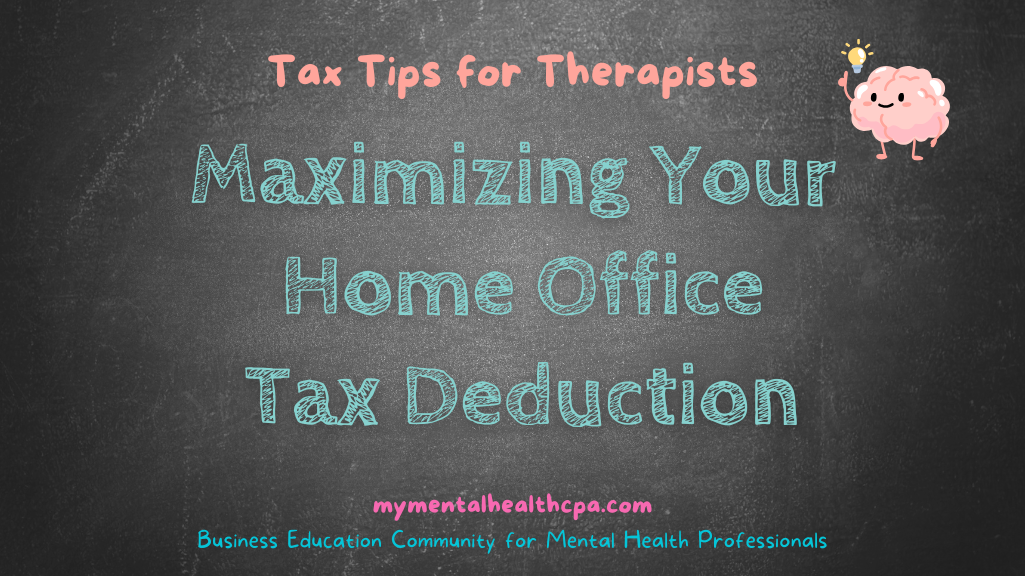July 15, 2024
Maximizing Your Home Office Deduction: A Guide for Therapists in Private Practice

As a therapist running a private practice from your home, understanding how to maximize your home office deduction is vital for reducing your tax liability. Whether you work exclusively from home, have another office, or are a W-2 employee working remotely, knowing the IRS rules and properly tracking expenses is key. This guide will help you navigate the home office deduction, ensuring you make the most of the tax benefits available to you.
What Can Therapists Deduct for a Home Office?
For therapists using part of their home for private practice, the IRS allows deductions for certain home-related expenses, provided the space is used exclusively and regularly for your business. Eligible deductions include:
- Mortgage Interest and Rent: Deduct a portion of your mortgage interest if you own your home, or a portion of your rent if you rent.
- Utilities: Partial deductions for utilities such as electricity, heating, water, and internet, based on the business use percentage of your home.
- Homeowners Insurance: Deduct a portion of your insurance premiums proportional to the space used for your practice.
- Repairs and Maintenance: Deduct costs for repairs benefiting your entire home partially, while repairs specific to your office may be fully deductible.
- Depreciation: Claim depreciation on the portion of your home used for your practice if you own your home.
Rules for W-2 Employees Working from Home
If you’re a W-2 employee working remotely, you cannot claim the home office deduction. The Tax Cuts and Jobs Act of 2017 removed the deduction for unreimbursed employee expenses, including home office deductions for remote employees.
Managing a Home-Based Practice with an Additional Office
If you run your practice from home and also use another office, the home office deduction may still apply, provided your home office is your principal place of business. Key considerations include:
- Principal Place of Business: Your home office must be where most administrative tasks (scheduling, billing, paperwork) are performed. If your primary work is from home, even if you occasionally see clients elsewhere, you can claim the deduction.
- Exclusive and Regular Use: The space must be used solely for your practice. Shared or dual-purpose spaces, like a guest room that doubles as an office, do not qualify.
Calculating Your Home Office Deductible Space
To maximize your deduction, accurately measure the portion of your home used for your practice. The IRS offers two methods:
- Simplified Method: Deduct $5 per square foot of your business space, up to 300 square feet, with minimal paperwork.
- Regular Method: Calculate the percentage of your home used for your practice by dividing your office space’s square footage by the total square footage of your home. Apply this percentage to your total home-related expenses to determine your deduction.
Best Practices for Tracking Home Office Expenses
Properly tracking your expenses is essential for maximizing your home office deduction. Here’s how to stay organized:
- Create a Dedicated Office Space: Ensure the area claimed is exclusively used for your practice, such as conducting virtual therapy sessions or handling administrative tasks.
- Keep Detailed Records: Maintain records of all home-related expenses, including utilities, rent, or mortgage payments, and repairs. We offer a free Google Sheet tool to help you track these expenses. Interested? [Get the Sheet!]
- Measure and Document Your Space: Measure your practice area accurately and document it with photos and notes for proof.
Final Thoughts
Understanding the home office deduction is crucial for therapists running a private practice from home. By knowing what expenses are deductible, accurately calculating your business space, and maintaining meticulous records, you can maximize your tax savings and stay compliant with IRS regulations.
At My Mental Health CPA, our mission is to empower therapists through education and support. We’re here to help you navigate the complexities of tax planning and preparation, allowing you to focus on providing the best care for your clients. For more details, visit Fortitude Tax & Accounting to see how we can assist with your accounting needs.
- Can I claim a home office deduction if I also work from another office?
Yes, you can still claim the home office deduction if your home office is your principal place of business, meaning most administrative tasks are done there. - What qualifies as “exclusive use” for the home office deduction?
“Exclusive use” means the area must be used solely for your practice, without any personal activities taking place in the space. - How do I calculate the percentage of my home used for business?
Measure the square footage of your office space and divide it by the total square footage of your home to determine the business-use percentage. - Is it better to use the simplified method or the regular method?
The best method depends on your situation. The simplified method offers ease, while the regular method may yield a larger deduction if your expenses are high. - What happens if I sell my home after claiming depreciation for my home office?
You may need to recapture the depreciation claimed, which could result in a taxable gain. Consulting a tax professional is recommended. - Can I deduct home office expenses if I’m a W-2 employee working remotely?
No, W-2 employees are no longer eligible for home office deductions due to changes in the tax law from the Tax Cuts and Jobs Act of 2017. - What records should I keep to support my home office deduction?
Maintain detailed records of your expenses, including receipts for utilities, rent, mortgage payments, and repairs. Also, document the measurements and exclusive use of your office space. - Can I claim a home office deduction for a shared space like a guest room?
No, the space must be used exclusively for your practice to qualify. Shared spaces do not meet the IRS’s criteria for the home office deduction.
This article is for informational purposes only and does not constitute legal, business, or tax advice. Please consult your advisors for guidance specific to your situation



Leave a Reply